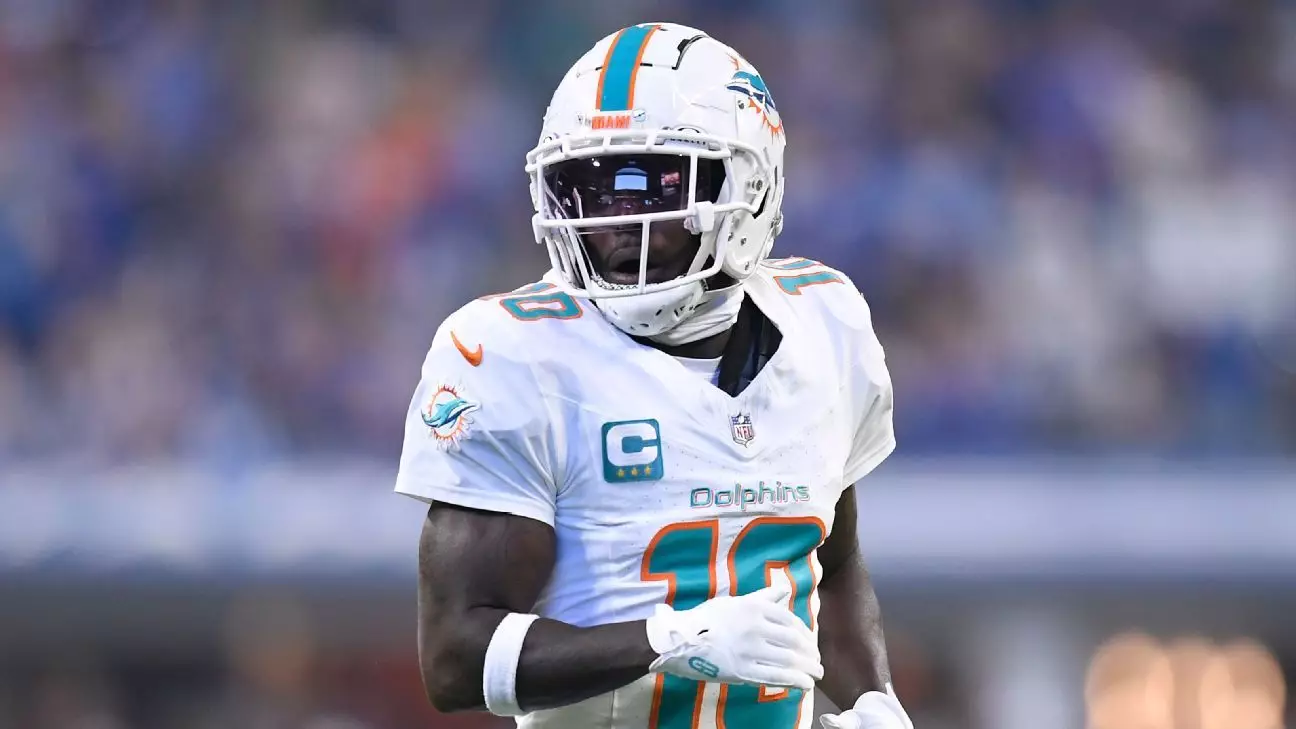The world of professional sports often veils personal struggles under a glittering façade of stardom and celebrity. This veneer has recently crumbled around Miami Dolphins wide receiver Tyreek Hill, following an alarming domestic dispute that forced police intervention. The unsettling reports taking center stage, including onlookers’ concern and police documentation, do not just reflect a one-off incident but hint at deeper-rooted issues that could potentially endanger not only Hill’s career but also the lives of those around him, including his family.
In the wake of the incident, which originated from a dispute between Hill and his wife, Keeta Vaccaro, we’re exposed to a complex web of tensions exacerbated by emotional volatility and resistance to addressing their problems head-on. Arguments revolving around parental responsibilities often act as flashpoints, and it’s concerning to witness how trivial disagreements can escalate into significant consequences, particularly when children are involved. This specific case raises critical questions about legacy, reputation, and the weight of silence in the wake of personal turmoil.
A Pattern of Behavior and Consequences
Tyreek Hill’s history includes various incidents that have raised eyebrows, presenting a troubling narrative about aggression and resolution. This recent encounter, described by witnesses as marked by Hill’s “very aggressive and impulsive” behavior, is set against a backdrop of troubling allegations—ranging from assault claims to civil lawsuits. Each incident serves as a reminder that athletes, often seen as superheroes in the eyes of fans, are fallible human beings whose failures can reverberate far beyond the sports arena.
Vaccaro’s comments regarding their therapy sessions show that help was sought yet not attained. Their marital discord and her reported intention to file for divorce highlights the extent of the service failure, where efforts to address family dynamics fall short, leading to more severe outcomes. Perhaps even more concerning is the visible bruise found on Vaccaro’s chest, raising alarms about the nature of their disagreements. While both parties characterized the incident as non-physical, the very implication that verbal conflicts can escalate to such points of physical evidence is alarming.
The notion that Hill’s actions left behind physical marks reinforces the alarming trend of ignoring emotional health and seeking help before circumstances spiral out of control. When someone like Hill, who leads an explosive career on the field, exhibits such reluctance to confront inner demons, it questions the very narrative we often embrace about personal and professional success.
The Ripple Effect on an Athlete’s Career
In the current era, an athlete’s off-field behavior carries as much weight as their performance on it. For Hill and the Dolphins, this controversy opens the floodgates to discussions around accountability and the public’s perception of athletes as role models. The support of the Dolphins organization following the incident is a double-edged sword. While it may be viewed as backing his career, it implicitly endorses a pattern of behavior that could have deplorable ramifications.
Moreover, the ongoing trade rumors surrounding Hill illustrate the volatile connection between personal issues and career prospects. His jokes about leaving the Dolphins resonate differently now, creating a chaotic narrative for fans caught between admiration for his athletic prowess and concern for his tumultuous lifestyle. The sports world is often unkind to those who falter, and Hill’s recent streak of incidents only heightens the scrutiny upon him. His talent will surely be acknowledged, but can his behavior remain unchecked without repercussions?
Beyond the Glitz: A Call for Responsibility
The nature of this situation highlights the urgent need for a cultural shift within the sports industry, pushing athletes to embrace their vulnerabilities rather than hide them behind a realm of bravado and celebrity. As admirable as it may be to showcase strength and perseverance, true strength often lies in confronting one’s challenges. Tyreek Hill’s story serves as a reminder that while he can outrun opponents on the field, avoiding inner conflict is a battle he cannot win through speed alone.
As fans and society examine Hill’s actions, it’s essential to delineate between support for a player’s capabilities and an acknowledgment of the responsibility athletes bear not only for themselves but also for those who look up to them. The way forward must involve open conversations about mental health, seeking help, and regularly engaging in reflection concerning one’s behavior and its impact on loved ones. These discussions are as vital as game strategies and performance analytics, reminding us that true success transcends the field.


Leave a Reply